Basics of agricultural animals feeding VOCABULARY
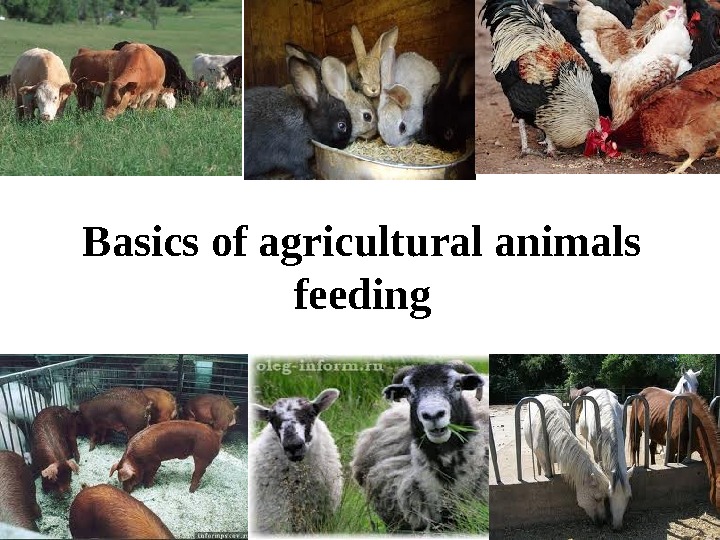
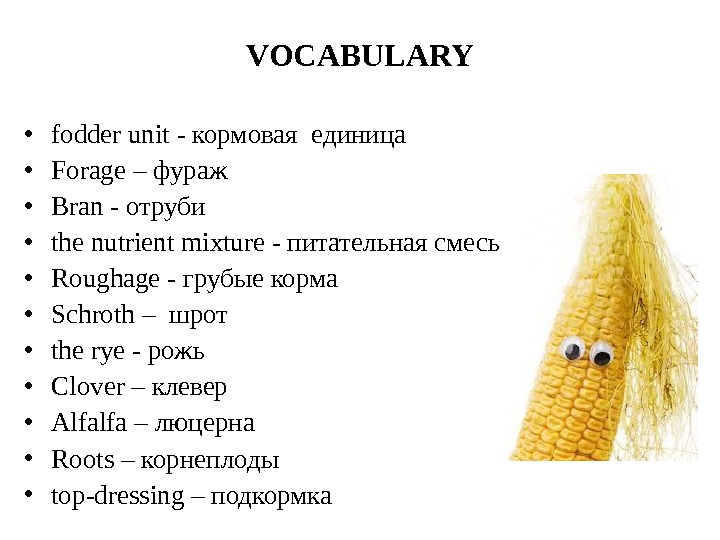
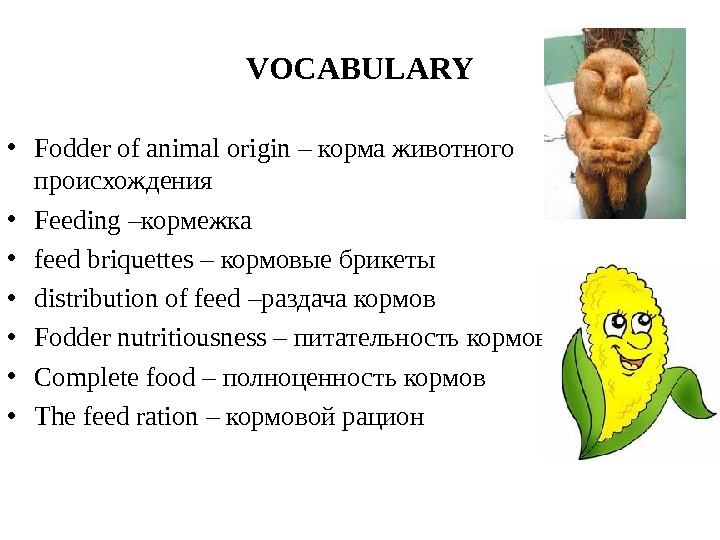
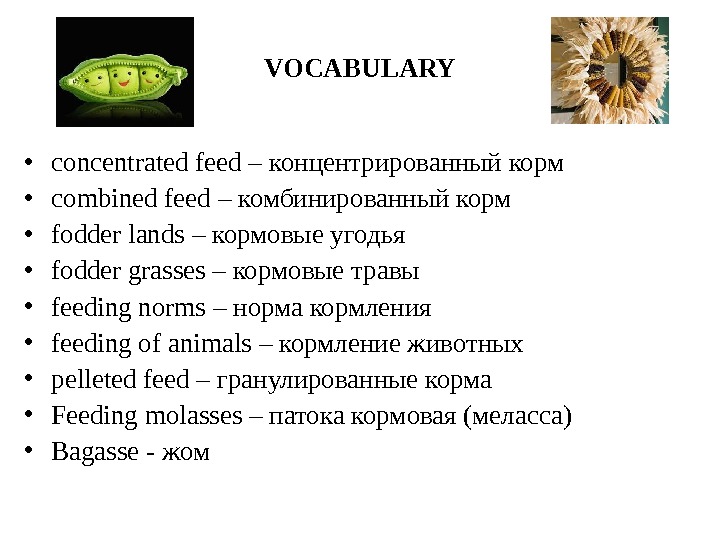
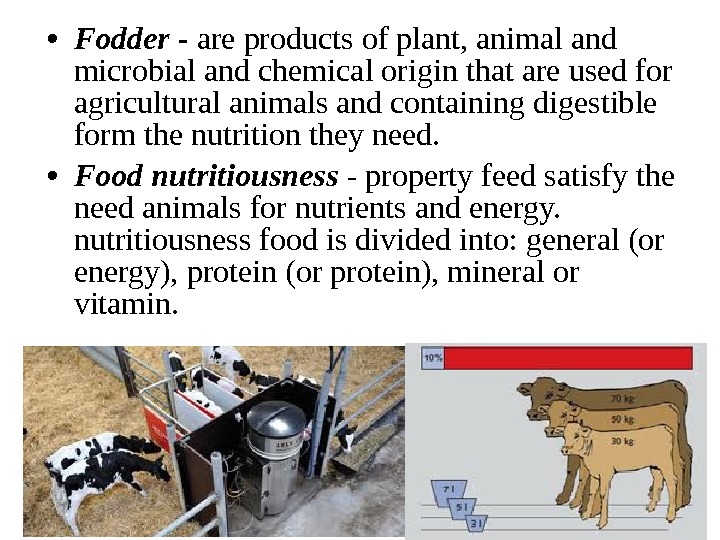
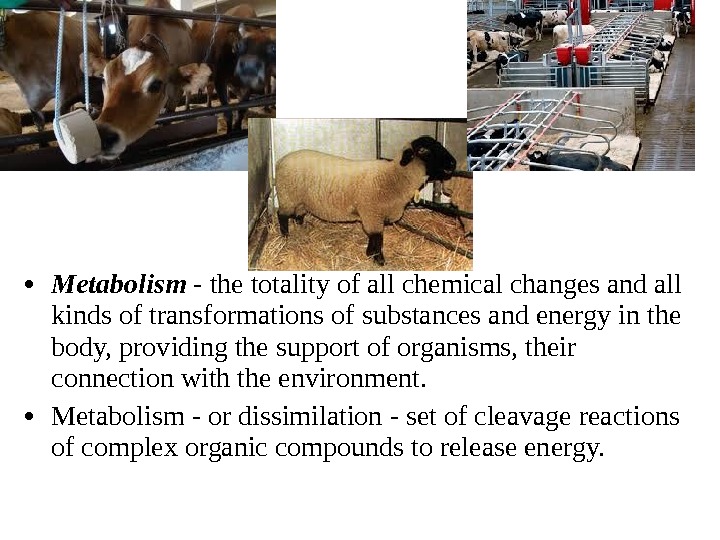
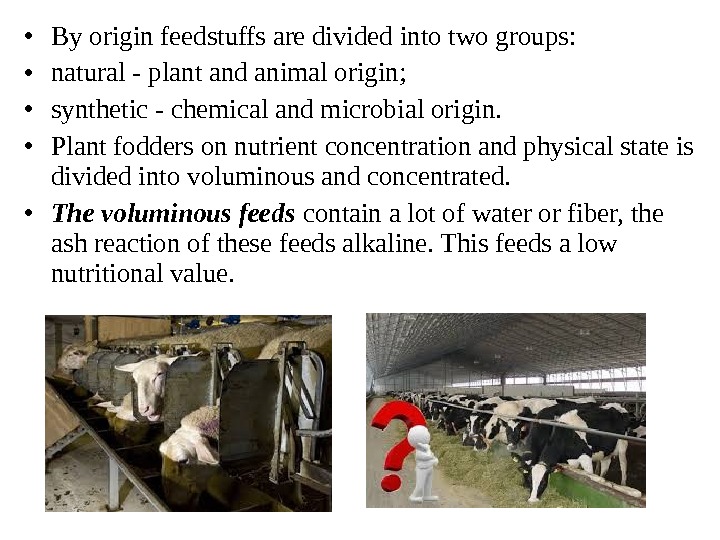
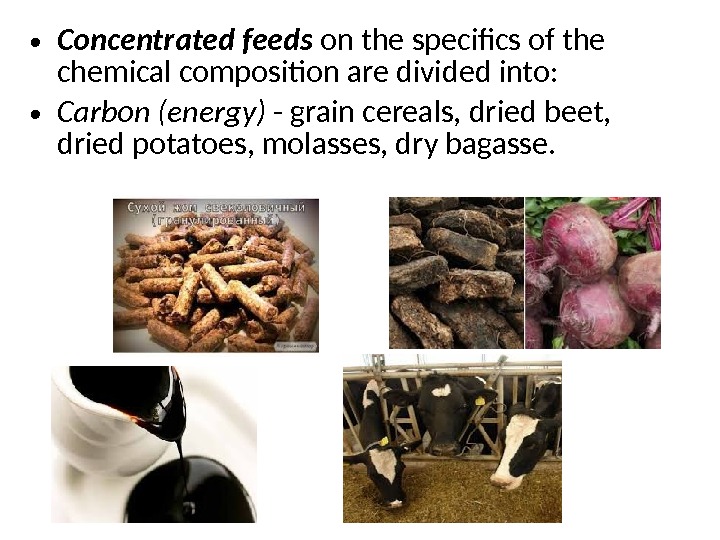
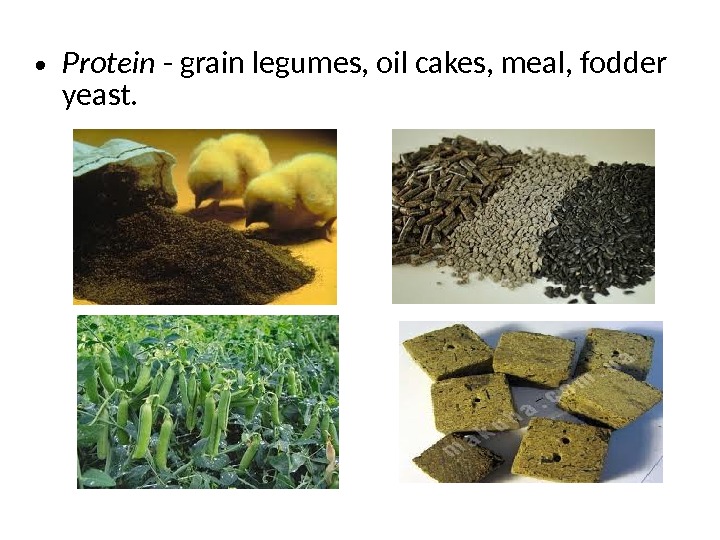
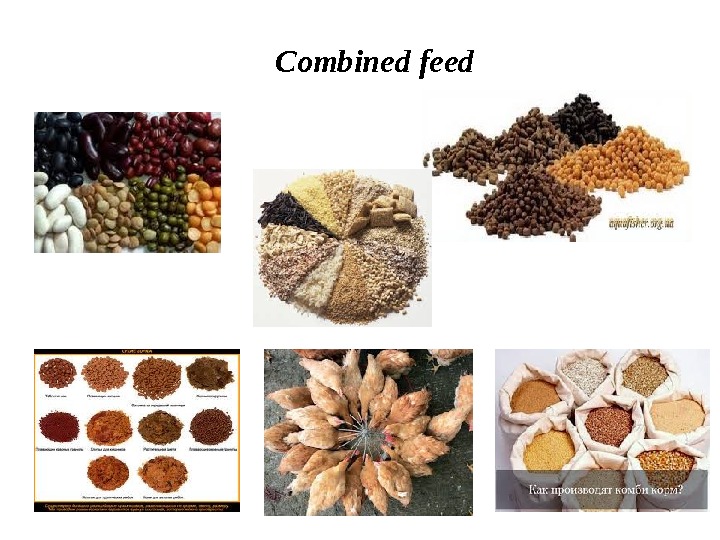
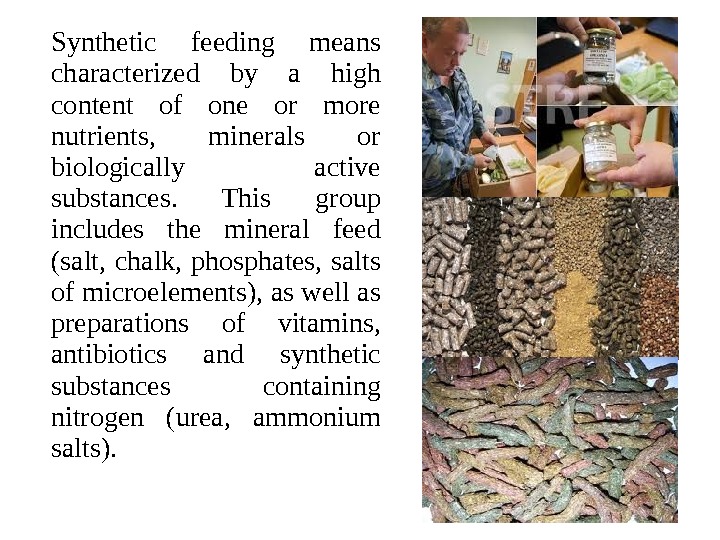
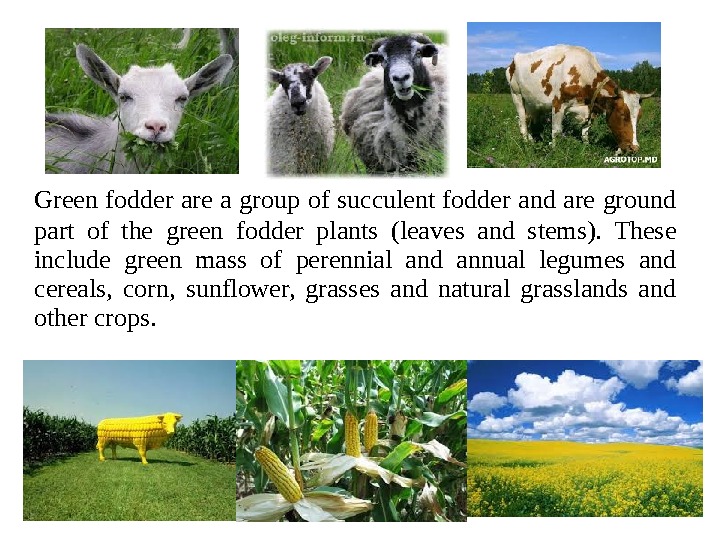
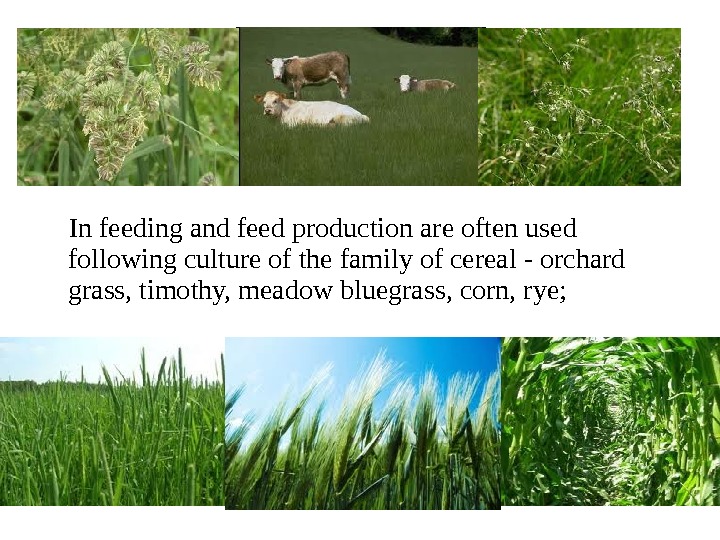
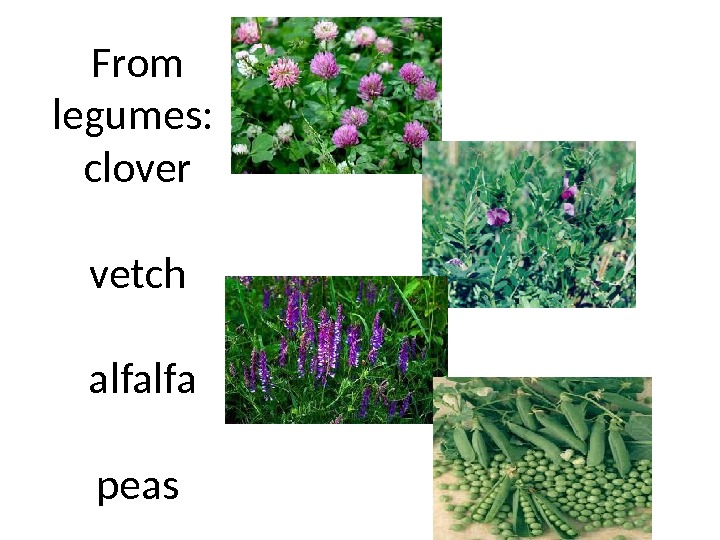
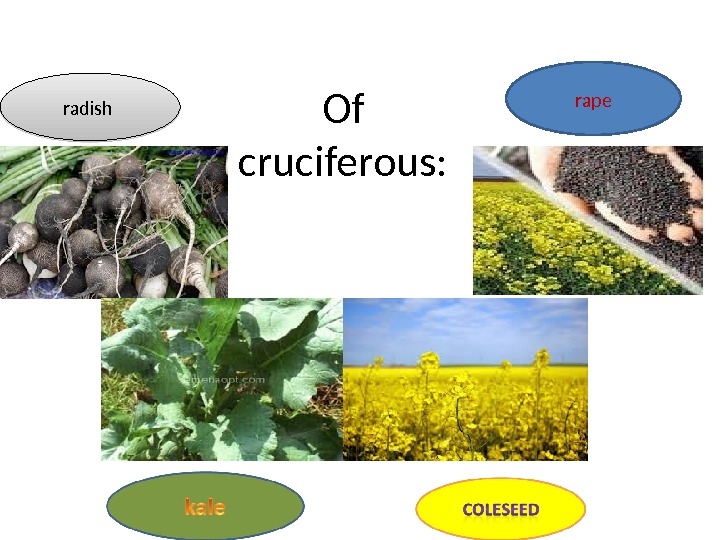
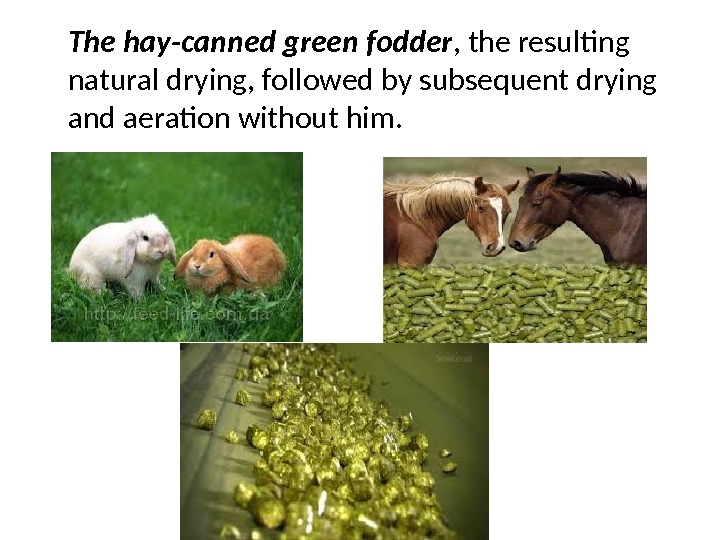
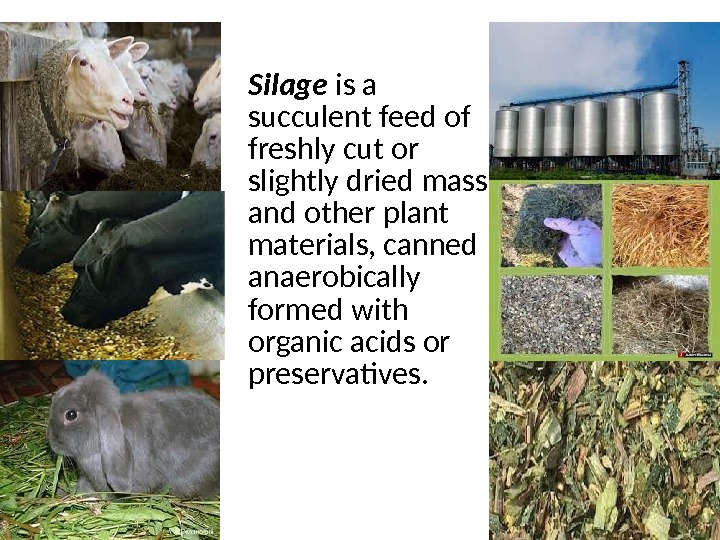
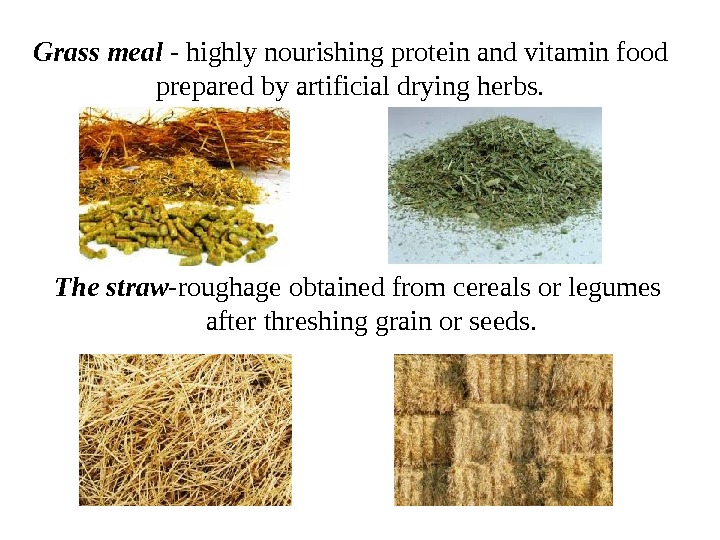
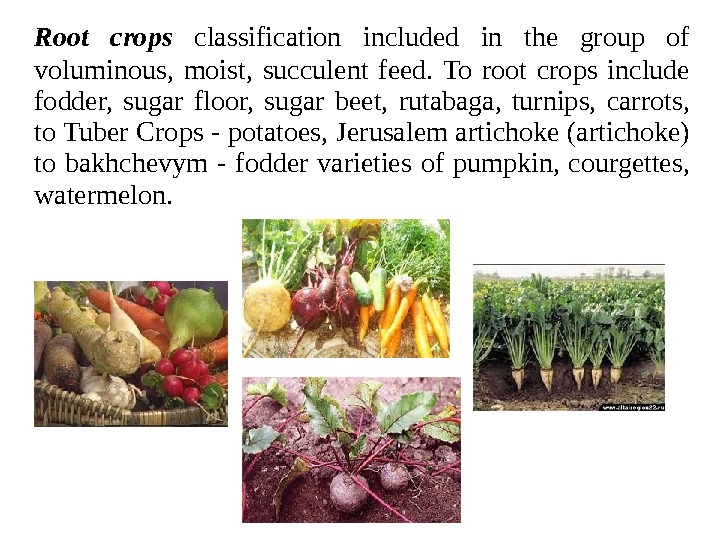
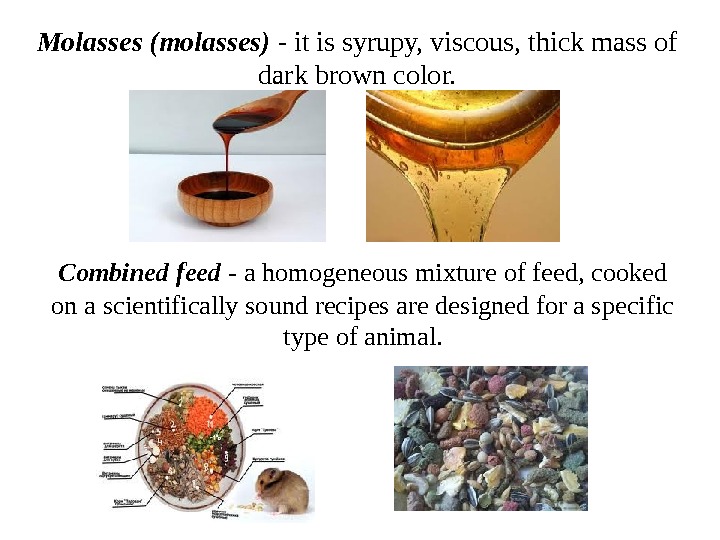
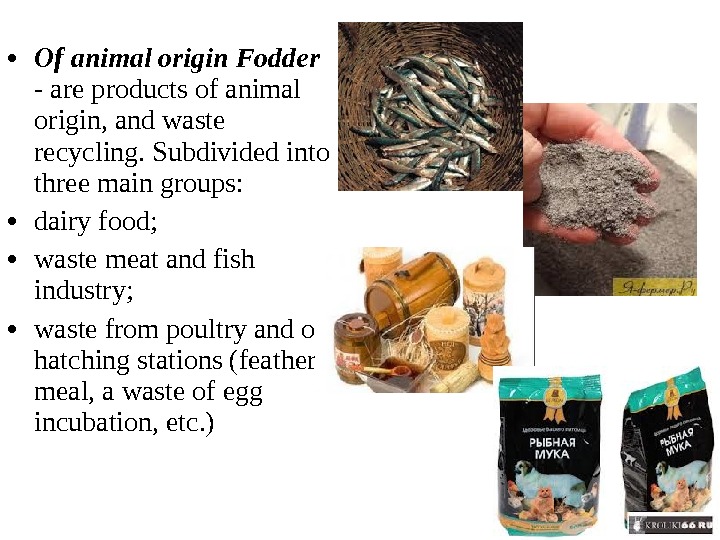


basics_of_agricultural_animals_feeding_3ppt.ppt
- Размер: 1.1 Mегабайта
- Количество слайдов: 23
Описание презентации Basics of agricultural animals feeding VOCABULARY по слайдам
 Basics of agricultural animals feeding
Basics of agricultural animals feeding
 VOCABULARY • fodder unit — кормовая единица • Forage – фураж • Bran — отруби • the nutrient mixture — питательная смесь • Roughage — грубые корма • Schroth – шрот • the rye — рожь • Clover – клевер • Alfalfa – люцерна • Roots – корнеплоды • top-dressing – подкормка
VOCABULARY • fodder unit — кормовая единица • Forage – фураж • Bran — отруби • the nutrient mixture — питательная смесь • Roughage — грубые корма • Schroth – шрот • the rye — рожь • Clover – клевер • Alfalfa – люцерна • Roots – корнеплоды • top-dressing – подкормка
 VOCABULARY • Fodder of animal origin – корма животного происхождения • Feeding –кормежка • feed briquettes – кормовые брикеты • distribution of feed –раздача кормов • Fodder nutritiousness – питательность кормов • Complete food – полноценность кормов • The feed ration – кормовой рацион
VOCABULARY • Fodder of animal origin – корма животного происхождения • Feeding –кормежка • feed briquettes – кормовые брикеты • distribution of feed –раздача кормов • Fodder nutritiousness – питательность кормов • Complete food – полноценность кормов • The feed ration – кормовой рацион
 VOCABULARY • concentrated feed – концентрированный корм • combined feed – комбинированный корм • fodder lands – кормовые угодья • fodder grasses – кормовые травы • feeding norms – норма кормления • feeding of animals – кормление животных • pelleted feed – гранулированные корма • Feeding molasses – патока кормовая (меласса) • Bagasse — жом
VOCABULARY • concentrated feed – концентрированный корм • combined feed – комбинированный корм • fodder lands – кормовые угодья • fodder grasses – кормовые травы • feeding norms – норма кормления • feeding of animals – кормление животных • pelleted feed – гранулированные корма • Feeding molasses – патока кормовая (меласса) • Bagasse — жом
 • Fodder — are products of plant, animal and microbial and chemical origin that are used for agricultural animals and containing digestible form the nutrition they need. • Food nutritiousness — property feed satisfy the need animals for nutrients and energy. nutritiousness food is divided into: general (or energy), protein (or protein), mineral or vitamin.
• Fodder — are products of plant, animal and microbial and chemical origin that are used for agricultural animals and containing digestible form the nutrition they need. • Food nutritiousness — property feed satisfy the need animals for nutrients and energy. nutritiousness food is divided into: general (or energy), protein (or protein), mineral or vitamin.
 • Metabolism — the totality of all chemical changes and all kinds of transformations of substances and energy in the body, providing the support of organisms, their connection with the environment. • Metabolism — or dissimilation — set of cleavage reactions of complex organic compounds to release energy.
• Metabolism — the totality of all chemical changes and all kinds of transformations of substances and energy in the body, providing the support of organisms, their connection with the environment. • Metabolism — or dissimilation — set of cleavage reactions of complex organic compounds to release energy.
 • By origin feedstuffs are divided into two groups: • natural — plant and animal origin; • synthetic — chemical and microbial origin. • Plant fodders on nutrient concentration and physical state is divided into voluminous and concentrated. • The voluminous feeds contain a lot of water or fiber, the ash reaction of these feeds alkaline. This feeds a low nutritional value.
• By origin feedstuffs are divided into two groups: • natural — plant and animal origin; • synthetic — chemical and microbial origin. • Plant fodders on nutrient concentration and physical state is divided into voluminous and concentrated. • The voluminous feeds contain a lot of water or fiber, the ash reaction of these feeds alkaline. This feeds a low nutritional value.
 • Concentrated feeds on the specifics of the chemical composition are divided into: • Carbon (energy) — grain cereals, dried beet, dried potatoes, molasses, dry bagasse.
• Concentrated feeds on the specifics of the chemical composition are divided into: • Carbon (energy) — grain cereals, dried beet, dried potatoes, molasses, dry bagasse.
 • Protein — grain legumes, oil cakes, meal, fodder yeast.
• Protein — grain legumes, oil cakes, meal, fodder yeast.
 Combined feed
Combined feed
 Synthetic feeding means characterized by a high content of one or more nutrients, minerals or biologically active substances. This group includes the mineral feed (salt, chalk, phosphates, salts of microelements), as well as preparations of vitamins, antibiotics and synthetic substances containing nitrogen (urea, ammonium salts).
Synthetic feeding means characterized by a high content of one or more nutrients, minerals or biologically active substances. This group includes the mineral feed (salt, chalk, phosphates, salts of microelements), as well as preparations of vitamins, antibiotics and synthetic substances containing nitrogen (urea, ammonium salts).
 Green fodder are a group of succulent fodder and are ground part of the green fodder plants (leaves and stems). These include green mass of perennial and annual legumes and cereals, corn, sunflower, grasses and natural grasslands and other crops.
Green fodder are a group of succulent fodder and are ground part of the green fodder plants (leaves and stems). These include green mass of perennial and annual legumes and cereals, corn, sunflower, grasses and natural grasslands and other crops.
 In feeding and feed production are often used following culture of the family of cereal — orchard grass, timothy, meadow bluegrass, corn, rye;
In feeding and feed production are often used following culture of the family of cereal — orchard grass, timothy, meadow bluegrass, corn, rye;
 From legumes : clover vetch alfalfa peas
From legumes : clover vetch alfalfa peas
 Of cruciferous : rape radish
Of cruciferous : rape radish
 The hay-canned green fodder , the resulting natural drying, followed by subsequent drying and aeration without him.
The hay-canned green fodder , the resulting natural drying, followed by subsequent drying and aeration without him.
 Silage is a succulent feed of freshly cut or slightly dried mass and other plant materials, canned anaerobically formed with organic acids or preservatives.
Silage is a succulent feed of freshly cut or slightly dried mass and other plant materials, canned anaerobically formed with organic acids or preservatives.
 Grass meal — highly nourishing protein and vitamin food prepared by artificial drying herbs. The straw -roughage obtained from cereals or legumes after threshing grain or seeds.
Grass meal — highly nourishing protein and vitamin food prepared by artificial drying herbs. The straw -roughage obtained from cereals or legumes after threshing grain or seeds.
 Root crops classification included in the group of voluminous, moist, succulent feed. To root crops include fodder, sugar floor, sugar beet, rutabaga, turnips, carrots, to Tuber Crops — potatoes, Jerusalem artichoke (artichoke) to bakhchevym — fodder varieties of pumpkin, courgettes, watermelon.
Root crops classification included in the group of voluminous, moist, succulent feed. To root crops include fodder, sugar floor, sugar beet, rutabaga, turnips, carrots, to Tuber Crops — potatoes, Jerusalem artichoke (artichoke) to bakhchevym — fodder varieties of pumpkin, courgettes, watermelon.
 Molasses (molasses) — it is syrupy, viscous, thick mass of dark brown color. Combined feed — a homogeneous mixture of feed, cooked on a scientifically sound recipes are designed for a specific type of animal.
Molasses (molasses) — it is syrupy, viscous, thick mass of dark brown color. Combined feed — a homogeneous mixture of feed, cooked on a scientifically sound recipes are designed for a specific type of animal.
 • Of animal origin Fodder — are products of animal origin, and waste recycling. Subdivided into three main groups: • dairy food; • waste meat and fish industry; • waste from poultry and of hatching stations (feather meal, a waste of egg incubation, etc. )
• Of animal origin Fodder — are products of animal origin, and waste recycling. Subdivided into three main groups: • dairy food; • waste meat and fish industry; • waste from poultry and of hatching stations (feather meal, a waste of egg incubation, etc. )
 • Premixes are a homogeneous mixture of biologically active agents and excipients. Used for the enrichment of mixed feeds. • Food waste is a waste public and individual nutrition, which are an important reserve of fodder for peri-fattening pig farms.
• Premixes are a homogeneous mixture of biologically active agents and excipients. Used for the enrichment of mixed feeds. • Food waste is a waste public and individual nutrition, which are an important reserve of fodder for peri-fattening pig farms.

